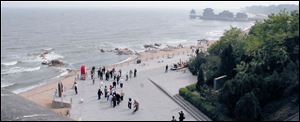
TOLEDO MAGAZINE
China: A land of ‘everything’
6/12/2011
The beach at Qinhuangdao is viewed from atop the Dragon's Head, which marks the beginning of the Great Wall of China.
China remains a mystery to most Americans and as soon as they arrive, it’s impossible not to be swept up in awe of massive development, congestion, and pollution wrapped around an ancient world full of monuments, artifacts, and natural beauty.
From Shenzen in the south to the capital city of Beijing in the north, the country is a mixture of modern civilization and the ancient world. Liu Wenge, the section chief of liaison and information for the Qinhuangdao Foreign and Overseas Affairs Office, described his homeland as a “place to see everything.”
It’s also a place to eat everything. During a nine-day trip to China last month, Toledo Mayor Mike Bell’s delegation of 12 were served meals that included jellyfish, poisonous blowfish, snake meat, lamb, a chicken dish with the head, lobster, and shark cartilage, and a dish called “stinky tofu” that certainly lived up to its name.
The roads in China’s major cities are orderly and insane at the same time. While lines painted on the roads define traffic lanes, they seem more like suggestions than rules. With car permits difficult to get in Beijing and vehicles too expensive for many of the millions of impoverished and middle-class citizens, bicycles and mopeds are the popular mode of transportation. Together they form a constant wave on roadways and sidewalks. Mothers hold their young children while driving the zippy two-wheeled vehicles.
Outside Beijing, the Great Wall winds through the mountains. It’s difficult to forget China’s politics when you see a huge rock sign stating “Long Live Chairman Mao” on the mountainside.
Other signs around the country offer Americans a humorous glimpse into “Chinglish,” a term applied to ungrammatical or nonsensical English in Chinese contexts. At the Great Wall in Beijing, one can follow the “step-way of mounting the Great Wall.” After taking the ferry from Hong Kong to Shenzhen, people can get their luggage back at the “Baggage Clam Area.”
Hangzhou is known in China as “Heaven on Earth” and it doesn’t disappoint. The city’s famous silk market is a collection of aggressive merchants offering great deals that require much haggling by Westerners — otherwise, they will pay as much as 200 percent more than what a local would pay for silk scarf or tie.
Mr. Liu pointed out that Qinhuangdao, Toledo’s sister city in China, is known as the country’s summer capital because government officials take off to the coastal city to avoid the searing heat and suffocating pollution during the summer months. Many agree that a vacation trip to China should include the city of nearly 3 million people, which is small by Chinese standards.
The Dragon’s Head, built in the mid-1500s and reconstructed in the 1980s, is the beginning of the Great Wall of China and sits in the ocean coastline along Qinhuangdao. That stretch of the wall reaches into the sea like a dragon drinking water, hence its name. The steps leading to the popular destination have been rounded by centuries of foot traffic and people still stand speechless on the monument that stretches across northern China — the same way they probably did hundreds of years ago.
Contact Ignazio Messina at: imessina@theblade.com or 419-724-6171.